Iran’s Ambitions and Popular Journalism: A Second Look
By Neil Earle
 President-elect Donald Trump
President-elect Donald TrumpAs Iran’s future as a possible nuclear state is debated it is possible to construct a working file on how the issue plays out in American popular journalism. The consistency is fairly surprising.
Doyle McManus summarized the basic options in his Los Angeles Times column of February 22, 2009 titled “A Plan B for Iran.” In the end, MacManus gave three possibilities for the USA going forward: stricter sanctions, Cold War-style containment with Israeli help, or war. This was before the controversial Joint Comprehensive Plan of Action (JCPOA) agreement was finalized in July, 2015. Concerns had already been expressed before Saudi Arabia’s king pulled out of a special meeting of the Gulf Cooperation Council held at Camp David May 14, 2015 where “misgivings” were laid on the table (Wall Street Journal, May 15, 2015).
The burning question now is how the new Trump Administration might proceed towards Iran after strident remarks made against JCPOA during the 2016 Presidential campaign. It is perhaps early to prognosticate on a new administration team that has the image of preferring fluid declarations to formal policy decisions but articles in the (sometimes) bellwether conservative weekly National Review may offer broad hints or be seen as think-pieces for Trump team considerations. In the December 13, 2016 article “Taking on Iran” Ray Takeyh of the Council on Foreign Relations – after a drop-head appeal to scrap the deal – argues for the fragility of Iran’s Khameni regime and possible American initiatives based on that premise. President Trump could use the “bully pulpit” of his office Reagan-like to denounce the clerics, destabilize it and simultaneously lobby the Sunni states in the region to pull together against the Shiite regional superpower of Iran. This would also include exploiting the already public Israeli-Saudi détente in the face of Iran’s moves of recent.
The power of the purse, of course, looms large in Takeyh’s analysis – sanctions brought the Iranians to the table to begin with. Columnist Benny Avni agrees in his comments on a possible British role: “The Brits pretty much own the insurance business that’s necessary to ship goods around” and “alongside American currency dominance, the two countries can squeeze Iran’s economy plenty on their own.” In addition to these sometime breathless commentaries, Ray Solomon’s new book The Iran Wars decries Obama Administration “appeasement” on Iran. Solomon notes how it was Congressman Mike Pompeo who led the charge against the $1.7 billion settlement to Iran as part of the JCPOA agreement and that Pompeo is Donald Trump’s choice to head the CIA.
Do coming events cast their shadows before? It might not take long to find out.
 Zbigniew Brzezinski
Zbigniew BrzezinskiWar-Gaming Iran
It was Doyle McManus back in 2009 who brought up the nightmare in everyone’s closet. He offered the relevant thought that “most (and maybe all) of Obama’s advisors see the costs of attacking Iran as outweighing the benefits.” This opinion in turn echoes an important Bush administration-era cover story by Atlantic magazine (Fall, 2004). In “Is Iran Next?” the magazine war-gamed a session using war college experts and arms inspectors playing different roles – from the U.S. President to Iranian officials.
The model in the back of everyone’s mind was Israel’s successful bombing of Saddam Hussein’s Osirik Reactor in 1981 (“Operation Babylon”). According to Atlantic’s team of experts, the Iraqi analogy broke down in a realistic application of basic facts. Iran has three times the land area and five times the population of 1980s Iraq. The Iranian program is scattered and hidden which would necessitate some 300 “aim points.” It is unlikely Israel alone could sustain this kind of effort especially since their jets (or even American jets) would most likely need to fly over Iraq and Saudi Arabia.
The war games presaged a brief report in Time magazine’s December 17, 2007 issue quoting the American Joint Chiefs. They concluded that even US forces could accomplish “severe damage” rather than a successful repeat of Operation Babylon. Nevertheless, former State Department Director of Policy Planning, Anne-Marie Slaughter, told CNN on June 6, 2013 that she was 60% certain the US would bomb Iran in 2013. Time’s Joe Klein made the same missed prediction. Those who favor green-lighting Israel for the mission point to the successful Israeli raid on Entebbe in 1976 as a more optimistic precedent which covered huge distances and involved multi-national co-operation for refueling and the like. (Interestingly this daring feat now bears the name “Operation Jonathan” after the only solider killed on the raid, it’s leader, who happened to be the brother of Israeli prime minister Benjamin Netanyahu).
Any way it is seen, this issue is fraught with consequences. Even conservative broadcaster Bill O’Reilly repeatedly opines how such a move would mean “World War III” and mercifully stops short of further prognostications as to the line-up of forces. Turn now to Zbigniew Brzezinski’s piece in the April 23, 2006 LA Times titled “Been There, Done That: Talk of a U.S. strike on Iran is eerily reminiscent of the run-up to the Iraq War.” Brezinski was President Jimmy Carter’s rather hard-line national security adviser from 1977 to 1981. He did not waste time ticking off the possible consequences of a U.S. or even Israeli air strike against Iran’s nuclear program.
 Former Secretary of State Robert Gates
Former Secretary of State Robert GatesA Progressive Upheaval?
First, the attack could be seen as a unilateral declaration of war, a possible impeachable offense for an American President. This takes on more relevance as President-elect Donald Trump assembled what was called “a team of generals” to deal with national security issues. Candidate Trump’s feelings on the recent Iran deal were well known: “It’s a disaster.”
Second, the consequences could undermine future U.S. strategies for Iraq and Afghanistan. “Iran is a country of about 70 million people, and a conflict with it would make the misadventure in Iraq seem trivial.”
Third, oil prices could climb steeply as in the 1979 era, especially if Iran cut oil production. (Brzezinski did not mention the Iraian ability to block the Straits of Hormuz, one of the main arteries for oil exports from the Middle East.)
Finally, the United States homeland could become even more a target of coordinated terror bombing and face renewed isolation and suspicion from the rest of the world. “In short,” says Brzezinski, ”an attack on Iran would be an act of political folly, setting in motion a progressive upheaval in world affairs.”
This seems the best case against military strikes. An Iranian perspective was given on CNN’s Fareed Zakaria show “GPS” on November 16, 2014 by Maziar Bahari. Bahari is the Iranian-Canadian journalist who was imprisoned by the Iranian regime in 2009 and the subject of the Jon Stewart-produced movie “Rosewater.” An attack, warned Bahari, would set back the moderate cause in Iran and lead to excuses for repression to be intensified inside the country.
In short, popular journalism has been remarkably consistent in showing there seems to be no viable military option against Iranian possession of a nuclear weapon. As McManus concluded, that leaves Cold War style containment as the only viable option.
Other Voices
This harmonizes with Anthony Bourdain's remarkably positive experience in his popular “Points Unknown” culinary documentary on CNN which featured his Iran trip of 2015. He was intrigued by the street level interaction and how popular American ways (such as sped-up car racing amongst youth) are in Iran. He echoed the National Geographic report of August, 2008 featuring “Ancient Iran: Inside a Nation’s Persian Soul” and showing how the West and Iran are tragically talking past each other on most issues.
Trite Parsi, president of the National Iranian American Council, saw the problem the same way in the LA Times. “Iranian bluster” and a long-reaching national sense of pride is set against U.S. ignorance and the “collapse of statecraft” between the two countries. Parsi quoted former U.S. Joint Chiefs of Staff Chairman Michael G. Mullen who summarized: “We are not talking to each other (officially) so we don’t understand each other. If something happens it’s virtually assured that we won’t get it right.”
The trend line in America’s popular journalism echoes the words of former Secretary of State Robert Gates that a military action against Iran would be “catastrophic.” This seems to be the consensus at present though it might always be possible to find contrary voices coming to the fore in the volatile year ahead.